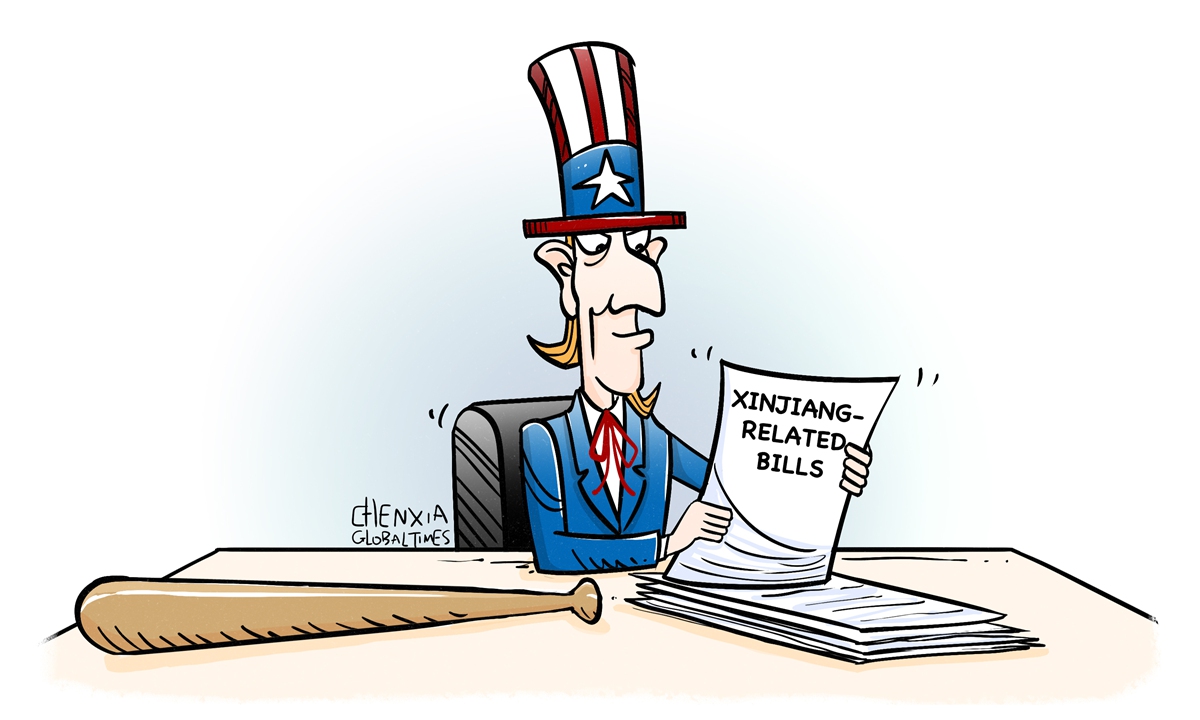US Congress’ Xinjiang-related bills indicative of typical hegemonism, power politics

Illustration: Chen Xia/GT
In recent years, the US Congress has witnessed increasing bipartisan consensus in its strategic competition against China. It has intensively pursued anti-China legislation, employing stereotypical tactics to contain China through legal means since US President Joe Biden took office. In particular, the US Congress is becoming more and more blatant in making up all kinds of lies about issues related to Northwest China's Xinjiang Uygur Autonomous Region and enacting related bills, which is increasingly becoming an accomplice of the White House's interference in the sovereignty of other countries as well as its exercise of hegemonism and power politics.There are underlying motives behind the frequent introduction of Xinjiang-related bills. First, the US sees China's economic rise as a threat to its global leadership. To safeguard its own position in the global economy, the US government has hyped up Uygur-related issues and introduced "the Uyghur Forced Labor Prevention Act," with the intention of imposing trade restrictions and suppressing China's economic development. Second, through the manipulation of Xinjiang-related topics, the US can divert public attention from domestic dissatisfaction and internal conflicts. Third, the US exploits the human rights issue in Xinjiang as a pretext to interfere in China's internal affairs, thereby perpetuating its hegemonic and power-driven approach on a global scale. Fourth, the US aims to disrupt the China-proposed Belt and Road Initiative by leveraging the Xinjiang-related bills, taking advantage of the region's strategic location. This strategy is intended to tarnish China's image in Central Asia and Muslim countries worldwide, while also impeding China's efforts to open up to the west.
The US' Xinjiang-related bills are without restraint. They will hurt not only China-US relations, but also Washington's credibility in the international community as well as its political stability and legitimacy at home. Ultimately, the US is shooting itself in the feet.
At the international level, the US exploits and politicizes legal means and frequently interferes in the domestic affairs of other countries, which will undermine its own judicial credibility and diplomatic authority, and solidify its international image as the biggest disruptor of the international order.
At the domestic level, those Xinjiang-related and anti-China bills will incite anti-Chinese and anti-Asian sentiments, spark conflicts between different ethnic groups and trigger social unrest in the US. This will lead to the loss of legitimacy of its ruling authorities. Moreover, the US Congress' manipulation of Xinjiang-related bills will impede US businesses and economic development. Every China-related bill passed by the US Congress will weaken the interdependence between the two countries, jeopardize common interests, and continually push up the risks of confrontation between China and the US.
Moreover, the US Congress has been actively passing legislation related to Xinjiang, seemingly portraying itself as the embodiment of "justice." However, it avoids facing up to its own domestic issues of hostility and discrimination against Muslims.
Within the US, there is open denial and hostility toward Islam, often associating it with extremism and terrorism. Open discrimination, isolation and even attacks against Muslims are prevalent. The spreading of Islamic cultural and Muslim population growth has sparked concerns and rejection among some elites and the public, leading to a significant increase in hate crimes against mosques and Muslims.
In addition, discrimination and attacks on Islamic countries and Muslim communities exist in US foreign policy. After the 9/11 attacks, the US government introduced a series of laws, regulations and policies primarily targeting Islamic countries, such as the "Enhanced Border Security and Visa Entry Reform Act," the "National Security Entry-Exit Registration System," and Donald Trump's Muslim travel ban.
In contrast, China has consistently prioritized the fundamental interests of all ethnic groups in Xinjiang, while fully respecting and safeguarding human rights and actively exploring effective ways to combat terrorism and extremism within the framework of the law. Significant achievements have been achieved.
China has always prioritized counter-terrorism legislation, decisively combating any form of terrorist activity and creating a secure and stable environment in Xinjiang to safeguard human rights. Xinjiang has seen no violent terrorist incident for more than five consecutive years due to the preventative counter-terrorism measures. Discrimination based on geography, ethnic groups, or religion is strictly prohibited in China's counter-terrorism practices.
China's preventative counter-terrorism efforts combine maintaining social stability with improving people's livelihoods. The dividends of Xinjiang's stability have continued to grow, with sustained healthy economic and social development. In 2020, Xinjiang achieved a regional GDP of 1.3797 trillion yuan ($213 billion), improving the lives of all ethnic groups and ensuring the comprehensive development of the region.
The US Congress will continue to produce anti-China bills under the pretext of democracy and human rights, exhibiting typical power politics and hegemonism. But facts speak louder than words, and the false narratives behind Xinjiang-related legislation in the US will eventually be discarded as trash of history.
The author is a research fellow of the Institute of History at the University of Chinese Academy of Social Sciences. opinion@globaltimes.com.cn


